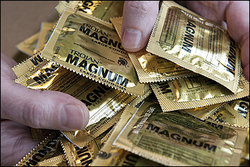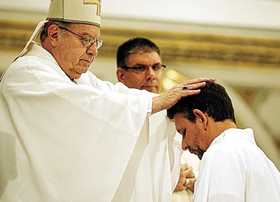That’s just one of the cringe-inducing questions that potential seminarians now have to answer, as part of the vetting process. And the New York Times takes a look at what that process entails in 2010:
Every job interview has its awkward moments, but in recent years, the standard interview for men seeking a life in the Roman Catholic priesthood has made the awkward moment a requirement.
“When was the last time you had sex?” all candidates for the seminary are asked. (The preferred answer: not for three years or more.)
“What kind of sexual experiences have you had?” is another common question. “Do you like pornography?”
Depending on the replies, and the results of standardized psychological tests, the interview may proceed into deeper waters: “Do you like children?” and “Do you like children more than you like people your own age?”
It is part of a soul-baring obstacle course prospective seminarians are forced to run in the aftermath of a sexual abuse crisis that church leaders have decided to confront, in part, by scrubbing their academies of potential molesters, according to church officials and psychologists who screen candidates in New York and the rest of the country.
But many of the questions are also aimed at another, equally sensitive mission: deciding whether gay applicants should be denied admission under complex recent guidelines from the Vatican that do not explicitly bar all gay candidates but would exclude most of them, even some who are celibate.
Scientific studies have found no link between sexual orientation and abuse, and the church is careful to describe its two initiatives as more or less separate. One top adviser to American seminaries characterized them as “two circles that might overlap here and there.”
Still, since the abuse crisis erupted in 2002, curtailing the entry of gay men into the priesthood has become one the church’s highest priorities. And that task has fallen to seminary directors and a cadre of psychologists who say that culling candidates has become an arduous process of testing, interviewing and making decisions — based on social science, church dogma and gut instinct.
“The best way I can put it, it’s not black and white,” said the adviser, the Rev. David Toups, the director of the secretariat of clergy, consecrated life and vocations of the United States Conference of Catholic Bishops. “It’s more like one of those things where it’s hard to define, but ‘I know it when I see it.’ ”
Many church officials have been reluctant to discuss the screening process, and its details differ from diocese to diocese. In the densely populated Diocese of Brooklyn, officials are confident of their results in one respect.
“We have no gay men in our seminary at this time,” said Dr. Robert Palumbo, a psychologist who has screened seminary candidates at the diocese’s Cathedral Seminary Residence in Douglaston, Queens, for 10 years. “I’m pretty sure of it.” Whether that reflects rigorous vetting or the reluctance of gay men to apply, he could not say. “I’m just reporting what is,” he said.
A footnote: Dr. Palumbo also screens candidates for the diaconate, and interviewed me and my classmates several years ago.
Check out much more at the link.
UPDATE: Fr. James Martin offers his thoughts on the Times article — and is decidedly unimpressed.

